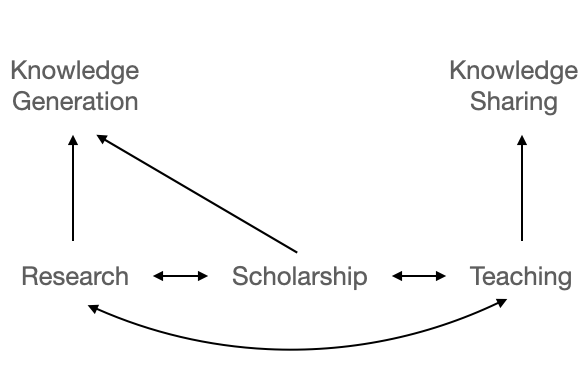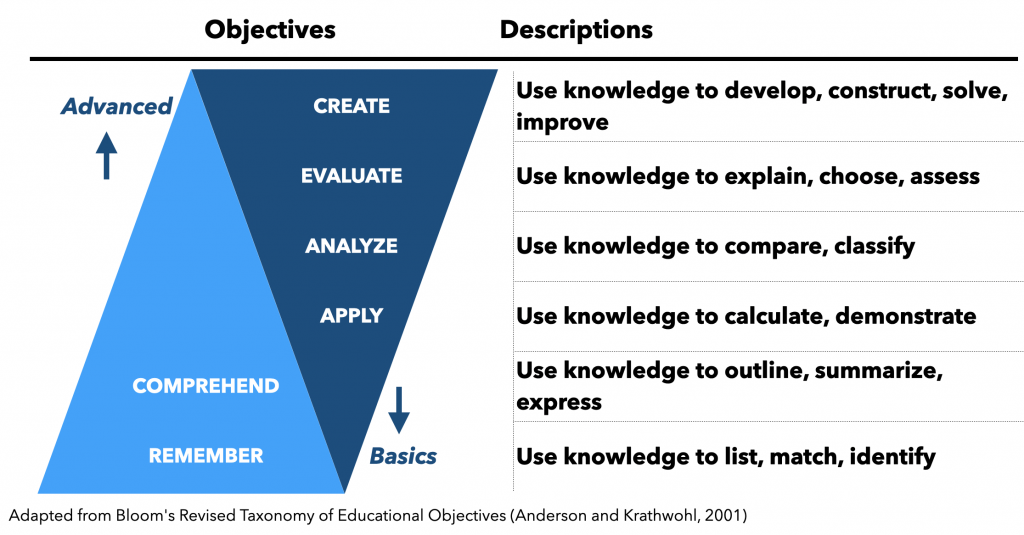Figure 1: Role of Knowledge Sharing in Learning

Researchers aim to generate and discover new knowledge (Figure 1). My doctorate degree in Business Administration is equivalent to a PhD in Marketing, and was awarded by the triple-crowned Koç University Graduate School of Business in Istanbul. I gained course design and delivery skills as a lecturer and a professor at TED (abbreviation for Türk Eğitim Derneği, Turkish Education Association) University (TEDU) in Ankara. Figure 1 illustrates how research, scholarship and teaching services work together for knowledge generation and knowledge sharing. Innovation, strategic brand management, sustainability and pricing are my main areas of scholarly interest.
–
The main function of universities is to provide environments that inspires, encourages and reinforces learning. Educators connect with the near future of human societies in these venues. I consider being a university professor, a job of a learning experience designer and a guide who helps to gain a perspective and understand the essentials of a subject matter – following Galileo‘s quote, “You cannot teach a person anything, you can only help him find it within.”
Marketing as an administrative science is highly relevant to professional work. In my courses, I embrace this fact from the beginning. Learners are often excited and knowledgeable at varying degrees in an evolving field. A university professor in marketing has to keep learning almost by definition, the needed effort to inspire learners and encourage to engage is dynamic.
In 2017, I accepted the offer at the Faculty of Economics and Administrative Sciences at TED University (TEDU) for an assistant professor position, realized in early 2022 due to some bureaucratic obstacles. In that five-year period, I was requested to offer a variety of courses – resulting in some serious teaching load. Yet building an infrastructure for learning is a responsibility with social importance. Indeed, being a professor comes with responsibilities for human development. In a few paragraphs I briefly describe my approach with reference to the courses I have designed and/ or delivered.
Quality of education can be measured as progress in critical thinking and freedom of expression. Teaching is then not a simple transfer of knowledge. It is motivational with providing the essentials to help learners keep building their knowledge on, and gain a professional perspective. In that regard, I am passionate to improve the education experience of learners in my courses as an active learning enthusiast. Opportunities to contribute to growth of learners and inspire ethical leadership are exciting.
Respect, accountability and transparency are three pillars for an effective learning. My approach is science and evidence based, connected to research and scholarship at its core. Integrating contemporary topics and research findings then improve the quality of sessions. In designing coursework and assessments, I follow Bloom’s model as a guideline, in Figure 2 below.
At TEDU I delivered Brand Management (BA464), New Product Development (BA462) and Social Media Marketing (BA465). Based on a request, I developed Digital Marketing for Education Institutions (MEI505), and delivered to a class of professional educators in the Management in Educational Institutions Master of Arts program. Other courses I delivered includes, Production and Operations Management (BA305), Research Methods (BA401, ECON401, PSIR401) and Principles of Marketing (BA301). In addition to these courses, I supervised fifteen graduation projects in Business Administration (BA402) and one in Economics (ECON402). In anonymous course evaluation surveys, my average rating is about 4.5 out of 5.0 at TEDU. Notably, in MEI505, the rating was 4.89 out of 5.00, assessed by professional educators, including teachers with over thirty years of experience. I find these as consistent indicators of satisfaction with learning experiences.
I joined Koç University in 2024 as a research-oriented lecturer for a year, a custom-designed position that has a long-term approach to develop faculty members who may excel on both research and teaching. At Koç University, I assumed the responsibility for Marketing Research (MKTG301), Innovation Management (MKTG404) and Strategic Brand Management (MKTG451, MKTG551). I also supervised the marketing module of the Capstone Project for the Business Administration program (BUSA499), along with professors of Strategy and Operations Management.
Here are some of the initiatives I was part of, related to course delivery. I highly appreciate the role of universities for societies in providing a robust venue for learning for university students and professors alike. I collaborate with Nazlı Wasti Pamuksuz (Professor of Management, ODTU) and Özlem Atay Özkanlı (Professor of Management, Ankara University), on a teaching case about new product development and brand management, expected to be available in 2025. I developed learning.love as an instrument to deliver recorded videos during the pandemic in a more privacy-sensitive platform, and then to continued developing it to support active learning in the post-pandemic period. I pilot tested Coursera integration in one of my courses at TEDU and also offered the first Vertically Integrated Projects course in Turkiye, which is also one of the earliest in Europe as part of an initiative for Innovation Capacity Building for Higher Education.
I consider all these as an indication of desire to contribute to human development for a better future.
Figure 2: An Illustration of Bloom’s Taxonomy

Here’s an Illustration of Bloom’s Taxonomy that I made. It is available under a Creative Commons Attribution license, free to share, reproduce and use it, as long as you attribute it to the learners.love.
“[A]mong college professors, there is a saying, ‘A handshake is good enough between businessmen. But when your university’s dean promises you something, get it in writing'” (Dixit and Nalebuff, 1993, p.151)
Reference
Dixit, Avinash K., and Barry J. Nalebuff. Thinking strategically: The competitive edge in business, politics, and everyday life. WW Norton & Company, 1993.